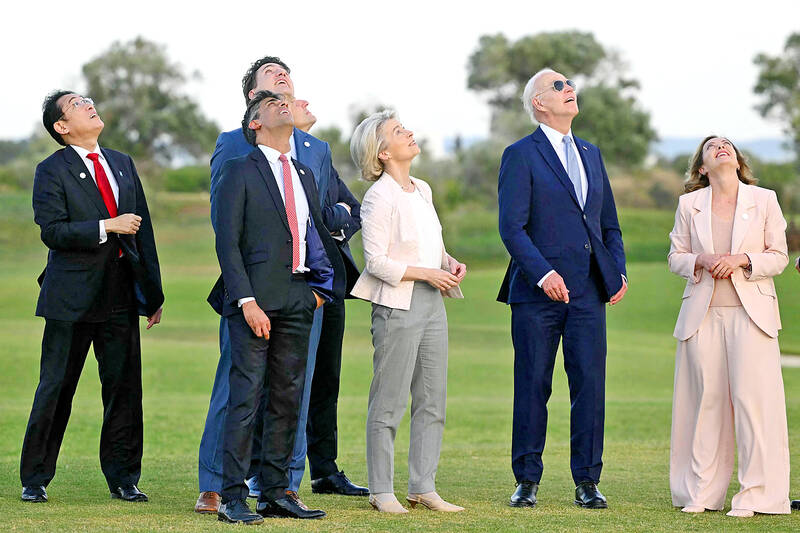G7 leaders yesterday turned their attention to China on the second day of a summit in Italy, with a focus on how to protect their industries while avoiding an outright trade war with Beijing.
Fair trade with the world’s second-largest economy, notably on green technology, was to be discussed by US President Joe Biden and the leaders of Japan, France, Germany, Italy, Canada and the UK in Puglia.
The G7 rich democracies would also be seeking a common response to China’s alleged support of Russia’s military expansion, which Washington says is fueling the war in Ukraine.

Photo: AFP
“G7 countries are on the same page vis-a-vis China,” a Japanese government source said.
The meeting came amid souring trade relations between China and the West, exemplified by the EU’s announcement this week of plans to impose new tariffs on Chinese electric vehicles.
The US, Japan and the EU — which attends G7 summits as an unofficial eighth partner — have all voiced concern over China’s so-called “industrial overcapacity.”
They say generous subsidies by Beijing, particularly in the green energy and technology sectors such as solar panels and electric vehicles, result in unfairly cheap goods flooding the global market.
That excess capacity threatens Western companies struggling to compete, particularly in the growing green technology sector.
“We will confront China’s non-market policies that are leading to harmful global spillovers,” US National Security Council spokesman John Kirby told journalists ahead of the summit.
China has dismissed the concerns, but Washington is pressing for a united G7 front.
The group’s finance ministers last month warned that they would weigh steps to “ensure a level playing field” for all nations.
On the eve of the summit at the luxury Borgo Egnazia resort, the EU threatened to hit imports of Chinese electric vehicles with tariffs of up to 38 percent beginning next month.
Beijing denounced what it called “naked protectionist behavior” and said it reserved the right to file a suit with the WTO.
The US hiked tariffs last month on Chinese green technology imports, including a 100 percent tariff on electric vehicles, with Biden blasting “cheating” on Beijing’s part.
Another focus yesterday was China’s restrictions on exports of minerals such as gallium, germanium and graphite, which are critical in industries such as telecommunications and electric vehicles.
The curbs threaten international supply chains and there are fears they could be followed by restrictions on other materials, such as rare earth elements needed in electronics.
Analysts have warned of near-term supply shortages and higher prices if China were to further restrict exports, even as the US and other nations are seeking to diversify their supplies, including by boosting domestic production.

Former Nicaraguan president Violeta Chamorro, who brought peace to Nicaragua after years of war and was the first woman elected president in the Americas, died on Saturday at the age of 95, her family said. Chamorro, who ruled the poor Central American country from 1990 to 1997, “died in peace, surrounded by the affection and love of her children,” said a statement issued by her four children. As president, Chamorro ended a civil war that had raged for much of the 1980s as US-backed rebels known as the “Contras” fought the leftist Sandinista government. That conflict made Nicaragua one of

BOMBARDMENT: Moscow sent more than 440 drones and 32 missiles, Volodymyr Zelenskiy said, in ‘one of the most terrifying strikes’ on the capital in recent months A nighttime Russian missile and drone bombardment of Ukraine killed at least 15 people and injured 116 while they slept in their homes, local officials said yesterday, with the main barrage centering on the capital, Kyiv. Kyiv City Military Administration head Tymur Tkachenko said 14 people were killed and 99 were injured as explosions echoed across the city for hours during the night. The bombardment demolished a nine-story residential building, destroying dozens of apartments. Emergency workers were at the scene to rescue people from under the rubble. Russia flung more than 440 drones and 32 missiles at Ukraine, Ukrainian President Volodymyr Zelenskiy

COMPETITION: The US and Russia make up about 90 percent of the world stockpile and are adding new versions, while China’s nuclear force is steadily rising, SIPRI said Most of the world’s nuclear-armed states continued to modernize their arsenals last year, setting the stage for a new nuclear arms race, the Stockholm International Peace Research Institute (SIPRI) said yesterday. Nuclear powers including the US and Russia — which account for about 90 percent of the world’s stockpile — had spent time last year “upgrading existing weapons and adding newer versions,” researchers said. Since the end of the Cold War, old warheads have generally been dismantled quicker than new ones have been deployed, resulting in a decrease in the overall number of warheads. However, SIPRI said that the trend was likely

‘SHORTSIGHTED’: Using aid as leverage is punitive, would not be regarded well among Pacific Island nations and would further open the door for China, an academic said New Zealand has suspended millions of dollars in budget funding to the Cook Islands, it said yesterday, as the relationship between the two constitutionally linked countries continues to deteriorate amid the island group’s deepening ties with China. A spokesperson for New Zealand Minister of Foreign Affairs Winston Peters said in a statement that New Zealand early this month decided to suspend payment of NZ$18.2 million (US$11 million) in core sector support funding for this year and next year as it “relies on a high trust bilateral relationship.” New Zealand and Australia have become increasingly cautious about China’s growing presence in the Pacific